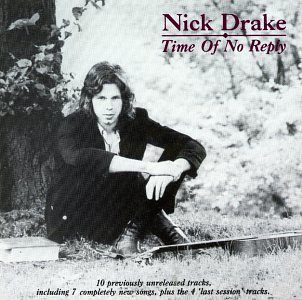 Any success that might have followed the release of Pink Moon was moot, as Nick Drake sank into depression, moved back in with his parents, and barely played any music at all, outside a pair of sessions in 1973 and 1974 where he had to record the guitar parts and vocals separately. These did not lead to a fourth album, and an overdose of a prescribed antidepressant ended his life in November.
Any success that might have followed the release of Pink Moon was moot, as Nick Drake sank into depression, moved back in with his parents, and barely played any music at all, outside a pair of sessions in 1973 and 1974 where he had to record the guitar parts and vocals separately. These did not lead to a fourth album, and an overdose of a prescribed antidepressant ended his life in November.His albums never went out of print, and five years went by before the label compiled the Fruit Tree box set consisting of his three albums, with his four known completed recordings from those final sessions added to Pink Moon. In 1986, the set was reissued with Pink Moon in its original sequence, plus a fourth LP, Time Of No Reply, which supplemented those four “new” songs with outtakes from Five Leaves Left and various home demos. (It was also released separately, which was nice of them.)
Those outtakes start the set, and are generally strong. The title track is a classic, with very clear, ringing guitar lines. It’s another pretty, deceptively cheerful-sounding melody. The middle section hints at the turmoil; he has pertinent things to say about the world around him, simple observations, but it seems to him no one wants to hear. However, “I Was Made To Love Magic” was given a dated arrangement with an uncomfortably affected vocal, and understandably cast aside, though a certainly pleasant ditty. “Joey” has a very mysterious mood, reminiscent of Leonard Cohen’s Suzanne. The subject is described as a guilty pleasure, though it’s hard to say if this siren can be considered a pleasure in the slightest. We can understand how and why Nick was so beguiled. “Clothes Of Sand” is one of his best, played in basically standard tuning with the B string tuned down to A for some enticing tones. The images are vague, but the overlying message that just enough has changed to turn everything in its wake upside down is clear. Either the person has changed, or his own perspective has been distorted that he doesn’t recognize what he once held familiar. “Mayfair” is a cute little sketch, possibly the single cheeriest song in his oeuvre. We can even hear him chuckle following a vocal flub before the “instrumental bit”. (Part of this was used later in a MetLife commercial, paired well with the animated image of Snoopy skipping happily across the screen.)
The versions of “Man In A Shed” and “Thoughts Of Mary Jane” included here are more relaxed, almost demos, and pleasant alternatives to their album counterparts; the latter features Richard Thompson on guitar. The home demo of “Fly” appears fully formed as we know it, with chirping birds and breezes taking the place of the keyboard and viola but not taking away the desperation in the vocal. Two earlier demos make an interesting transition. “Been Smoking Too Long” was written by a friend of his about the dangers of opium. The music is very close to Davy Graham’s “Anji”, which was the springboard for 90% of what is considered modern folk music. While “Strange Meeting II” dates from the same era, the sound is better, as is the writing. (And why isn’t he concerned about her “clothes of sand”? Another hidden gem.)
The final four 1974 recordings close the collection. The juxtaposition of these songs with the stark pieces on Pink Moon made some sense at the time, but tarnished the hopeful end of that album. They work much better in this context. “Rider On The Wheel” is very pretty, if a little basic and vague. You can hear just a hint of how weak his voice has become, a clue that is even more revealing in “Black Eyed Dog”. It has simple accompaniment with something of a dulcimer approach, but once he changes the melody in the middle section to a keening wail it’s clear he doesn’t consider the dog an ordinary stray. His delivery of “I wanna go home” is unsettling, and the instrumental break after this admission picks up the pace, distracting him from the turmoil, but as the song ends, the dog is still at his door. “Hanging On A Star” is very much in the vein of the transitional songs on Pink Moon; short and repetitive, yet effective. The middle verse, where he’s left abandoned at sea, is incredibly poignant in itself, made more so by his weary voice. Truly, he didn’t understand why the fame forbode in “Fruit Tree” evaded him. “Voice From The Mountain” has a claustrophobic, straitjacketed arrangement in standard tuning, with his rigid fingerpicking a contrast to his more fluid style. The solo section varies the theme enticingly, in a similar manner to the bridge in “Northern Sky”. Hearing this at the end of the album, one can really sense the strain in his voice.
It’s said that an artist’s entire life goes into the first album, with discarded songs only occasionally being revived down the road. Nick said for each of his subsequent sessions that there was nothing more, which is why few outtakes have emerged from the other two albums. For the longest time, Time Of No Reply was the last we heard of Nick Drake. Those wishing to hear more could only turn back to Five Leaves Left. This album has since been superseded by another, and is now out of print, but it’s still a special collection.
Nick Drake Time Of No Reply (1986)—3½
Current availability: none
No comments:
Post a Comment